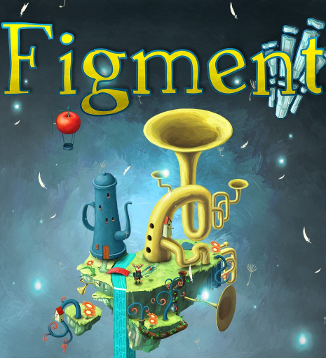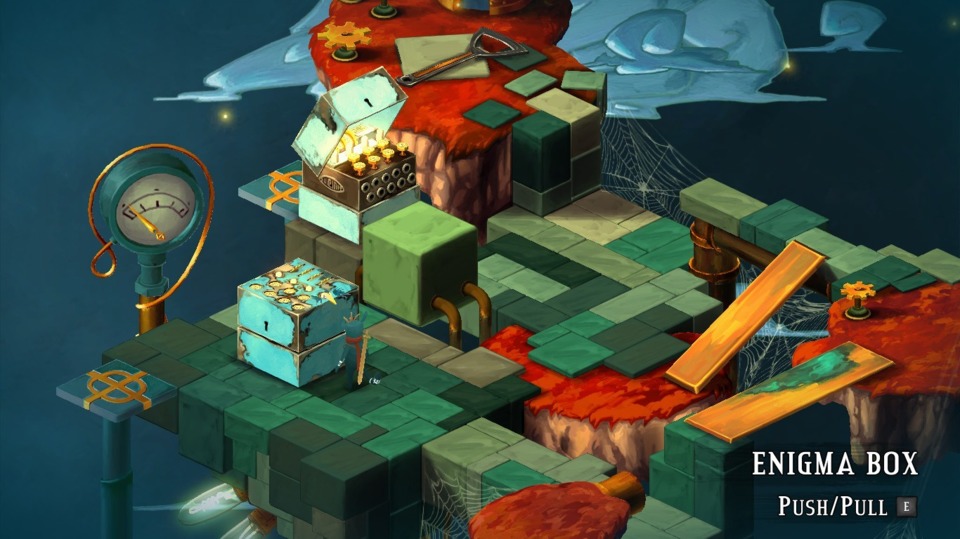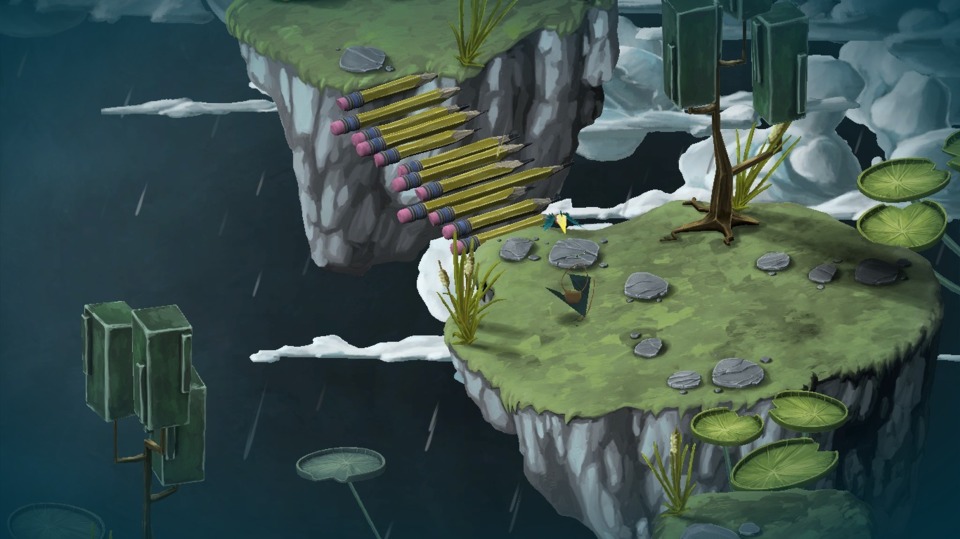Indie Game of the Week 123: Figment
By Mento 0 Comments

A good video game environment is one that can balance breathless spectacle, deadly hazards for the requisite challenge, and a certain mutability that ensures the journey through is never too predictable - and no better environment provides all three of these traits than the human mind. I covered the first release from Bedtime Digital Games a few months ago - the isometric somnambulist puzzler Back to Bed - and the follow-up Figment is both an extension of the idea of traversing the often dangerous unconscious mind but also an attempt to spin more of a complete narrative around that concept, creating characters and settings that represent different aspects of our id, ego, and superego, as well as taking the separate creative/logical hemispheres of our brain and turning them into thematically germane levels (the logical left side becomes "Clockwork Town," while the flighty creative right side is "Freedom Hills").
In order to expand the puzzle gameplay of Back to Bed, which frequently had you move props around to redirect its somnolent host, Figment also involves a lot of puzzles that requires picking up a prop from one part of the level - a "synapse battery," or a wheel for a valve switch, or a platform disc for an elevator - and finding out where it goes. Unfortunately, this leads to a lot of instances where you're having to go back and forth to recover items you need in multiple places, simultaneously making their prior use redundant by some secondary path so that they can be safely removed and transported to where they're needed again. An example of this would be a situation where you're blocked by a cloud of smog and must install an elevator disc to take an alternate path, removing the smog once you get on the other side by activating a windmill there, and then backtracking through the elevator section so you can then recover the disc platform for another elevator sequence just past the smog trap you disabled. One particular area had you lay down a few props to reach a water pipe system - which had to have the whole animation of the water pipe coming into view every time it was activated - in order to water a seed and grow a flower: I would then remove the props needed to turn on the water in case I needed them elsewhere (a practice that the game implicitly encourages early on) only to find another seed to grow elsewhere, necessitating I complete all those stages - with the full water pipe animation - again, and subsequently dismantle it all again. Shortly after all that, I find a third seed. Sigh.

Then there was another exacerbating condition - though one the game is only partially to blame for - with the serious problems I was having getting the graphics card to play nice. This caused sprites to flicker in and out of reality, or to stay completely invisible, which in addition to being unpleasant to look at (or not look at, in some cases) also made some puzzles and combat sequences - the Zelda-like swordfighting isn't the game's strong suit at the best of times - far more challenging than they might've been otherwise. It's hard to fight an opponent you can't see, after all, though their shadows were often visible at least. The protagonist Dusty - a manifestation of the host mind's courage - would become a whirling polygon mesh with floating eyes whenever he animated, which perhaps made him a little more terrifying than intended. Another side-effect of this graphical tomfoolery was that it made the lag incredible for certain areas of the game, particularly the rain-drenched denouement as you closed in on the game's antagonist - a nightmare born of the host's fear of loss - and the much harder puzzle/action sequences that precipitated your final battle. Yet even setting aside the graphical weirdness that probably won't be a factor to many playing the game, the deeply annoying puzzles - both the inventory juggling kind and a few later sequences where you direct obstinate creatures around a maze or are forced to remember routes across a blank grid of squares - were enough of a turn-off alone.
It's evident pretty early on that the game was also made in Scandinavia (Denmark, to be precise) by the voice acting. The actors do an overall okay job with what must be a mostly unfamiliar language, and there's a lot of funny wordplay that still works, but every so often you'd hear a malapropism come along and it's both charming and a little disappointing. At one point your chirpy, Navi-like bird sidekick remarks on how "stinky" someone was being with a precious key item, presumably intending to use the word "stingy." For whatever reason, each boss also serenades you with a musical number while in their boss fight, and most of the VAs do their darndest to deliver the lyrics in tune with the music but often find themselves with too many extra syllables, possibly because the music was written for a different language (or it was meant for English, but no-one considered how it would sound beforehand). It's all a little off as a result, though one exception is the "Fear of Spiders" boss and her playfully sinister yet seductive Björk-esque performance by Danish singer Tone - she sounded far more natural singing than talking, conversely. None of this a huge negative, mind - there's something about the slight uncanniness of it all that maybe even benefits the dreamlike universe of this unconscious setting, like the backwards-talking Lodges of Twin Peaks - but it's indicative of what I feel is Figment's biggest drawback: its ambition outstripping its ability.

We saw this also recently with Ittle Dew 2: there's an unspoken rule in any entertainment industry, which pervades every tier of game development from relatively small projects like Figment to the massive-budget AAA league, where sequels always have to be more ambitious enterprises to justify their existence. I doubt Bedtime Digital Games had to worry about some suit from the marketing department coming downstairs with a brusque PowerPoint presentation, gesticulating emphatically towards the slide that says "Bigger and Better!", but at the same time I can appreciate that a developer would release something like Back to Bed and decide that, hey, we already did X, there's no reason to just do more of X, so we should try doing Y next time. Ittle Dew 2's developers decided that in order to evolve, they would introduce a(n ultimately deleterious) secondary focus on challenging combat encounters in addition to the original game's devious puzzle chambers. Bedtime Digital Games, likewise, knew that it had a winning formula with puzzle games set in dreamscapes but wanted something more than the single-screen re-direction puzzles of Back to Bed, vastly expanding the number of challenges and the presentation around them, in a manner that perhaps wasn't always beneficial to the final product. You can't blame a studio for wanting to try new things, especially if they couch them inside a format that has already proven to work, but there is such a thing as biting off more than you can chew.
Figment is a briefly touching, occasionally witty, frequently clever action-puzzle game that has mutated considerably from the humble blueprint presented by Back to Bed, but a lot of those mutations are of the flippers and tentacles kind: not wholly beneficial changes to the original, and certainly not desirable. All the same, I can't help but admire the amount of ambition and passion that went into this more substantially layered game and its song-and-dance presentation, warts and all. I just wish it was several magnitudes less annoying and more stable.
Rating: 3 out of 5.
| < Back to 122: The Mooseman | The First 100 | > Forward to 124: Holy Potatoes! We're in Space?! |
